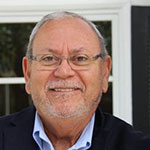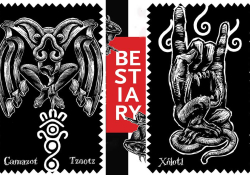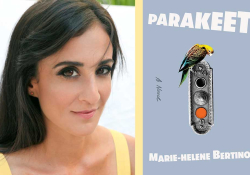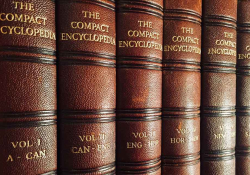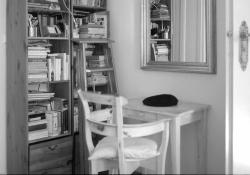The Case of the Nuncas
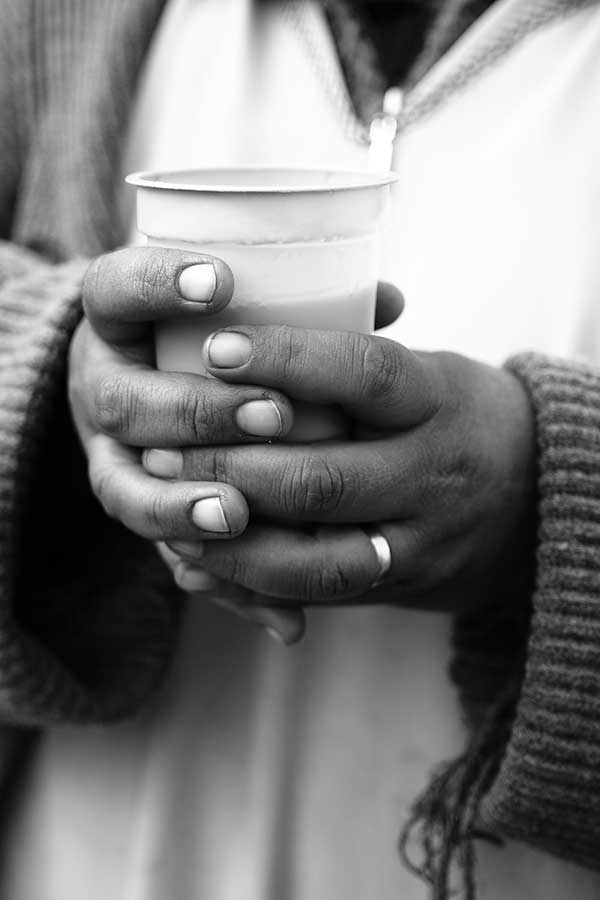
The 2018 National Hispanic Hero Award winner reflects back on his education and his grandmother’s “Nunca me . . .” sayings, finding that, over the years, he came to have “Nunca” sayings of his own.
My grandmother Cuca, short for María del Refugio, would speak only in Spanish and in what I sometimes thought were “tongues,” as in the Bible story of Babel. Nope. They were dichos, Spanish for folk sayings. I never figured out one that started with “Nunca me . . .” I never heard the full sentence. Maybe she was talking about some Indian tribe in Mexico. I never asked for an explanation of Nunca, much less the muttering after that word. Kids were not supposed to speak back to adults, only listen and follow instructions. Also, we could never ask, “Why?”
In high school years, we never discussed dichos in Spanish class; only Benjamin Franklin’s Poor Richard’s Almanack in English class. You remember: “A stitch in time saves nine”; “Bird in the hand is better than two in the bush”; and “Careful what you wish for, it may come true.” Our English teacher did say that folk sayings were ideas based on old wisdom which have danced across centuries. I wondered then who wrote the dichos in Spanish.
During my last high school years, I began to hear other students and teachers talking about going to college. No teacher ever asked me about that, nor did fellow students let me join in their conversations. So, I kept to myself and conjured up another crazy idea of going to college to become a lawyer. I didn’t know any lawyer or ever meet one except once in Piedras Negras, Mexico, across from Eagle Pass, Texas. Shortly before my father died, when I was twelve, we went there to a bank and a lawyer’s office. The door sign read “Notario,” not “Abogado.” I was confused but did not ask why. The lawyer man was impressive. He was as tall as my father; had a mustache like my father; wore a dark suit with a tie; and his shirt sleeves had jewelry peeking out at the arms of his suit—jewelry not his watch. He and my father talked in private; we waited outside. I did ask my mother what those jewelry things were. She told me they were mancuernillas. Bingo! I decided then that I would grow up, become a lawyer, and wear suits with mancuernillas.
When Father died, my mother and I had to hit the migrant trail like the hundreds of thousands of others from Texas, especially South Texas, going north in search of work. The housing and wages for migrants were bad, as was the treatment by the contractors, mostly Mexicans, and growers, all whites. We were expendable; there were more migrants than jobs. If we were heard talking about bad working conditions or better hourly wages, we were accused of being communists. I did not know what that was. I asked my mother, and she did not know either. She did say, “I think it is like our frijoles. They don’t like to eat them. So, pinto beans and communism to them are bad.” I love refried beans and beans ala charra with tortillas de harina. Yummee.
If we were heard talking about bad working conditions or better hourly wages, we were accused of being communists.
When I graduated from high school, I applied to the University of Texas in Austin but was rejected on residency. My mother was still working in Illinois. I innocently put that address down on the application as where she lived. But I could not afford out-of-state tuition, so I ended up at the nearest junior college. During my last two years, I attend college in Kingsville. Back then there were no public four-year schools south of Austin, only Kingsville in the middle of the King Ranch. I continued as a migrant worker until my junior year. I did not know about work-study, scholarships, student loans, only knew of working to pay my way. On weekends, several of us would pitch in for gas for a buddy with a car to drive us home for the weekend. Of course, I would cross town to visit my grandmother and hear more Nuncas. She did engage me in conversation now that I was nearing twenty-one years of age. Regularly, she asked where I was working. I explained I was going to college. I told her, like everybody else, “I’m doing okay, getting by, and will graduate when I get done with a few more hours.”
Grandma would listen intently to my words each time she asked about my college progress. On a trip home during my last semester, she asked in terse Spanish how I was doing. But she added, Dime en minutos no horas cuanto te falta!” (Tell me in minutes not hours how much more you have to finish!). I dared not laugh at her. But that story on credit hours kept us laughing on the drive back to Kingsville and for years to come.
Upon graduation, I applied to the University of Houston Bates College of Law but never got there. Love and the draft got me. First, I had to go into the US Army. Second, I married my sweetheart, whom I met while at college, before I left. During the last months of duty, when I came home on furlough from the Army Reserves, we discussed starting a family. No sooner said than done. She wrote me of being with child. I came home with an honorable discharge and in time to greet my first baby boy. Nobody in or out of the Army told me of the GI benefits I could use to pay for going to law school or buying a home. It is hard to know what you don’t know.
It is hard to know what you don’t know.
We both got jobs teaching, but I had to go back to summer school because my political science degree was not in education. Odd that when you major in education, they do not teach you how to teach, you just go observe and practice one semester. And, when you go to law school, they do not teach you how to run a law practice, just let you take clinics to see how others do cases—maybe if you have good grades, a summer internship at a big law firm to see how it works.
Well, my wife and I made more beautiful babies, four of them by the time I was in my mid-thirties. My teaching salary combined with my wife’s teaching salary could not keep up with our mounting expenses and past-due bills. I decided to try going to law school, knowing that most lawyers do make good money. Tragedy struck again. My mother died the first week I was in law school at age forty-one. I had to borrow money to pay for her funeral. Literally, we had no money, just getting by on the salary of my wife. I contemplated dropping out and should have because I was not attending class and, when I did, could not concentrate. I became known as the grown-man freshman who said “I don’t know” when called on by the law professors. We got past that period. The Spanish dicho for that is No hay mal que por bien no venga. Kind of like “There is a silver lining in each dark cloud.” For years, we had to pay debts tied to that horrible nightmare period in our lives.
I began to have trouble during my 2-L year; reading the countless cases, outlines, and hornbooks. I could not see well despite wearing glasses since junior college. I am color-blind and night-blind. If you are both color-blind and night-blind, you lose perception when there is little or no light. Everything is dark. You hold on to handrails on stairs, walk slowly, and shuffle like an old man. You trip and fall at times because you cannot see the landscape and its ups and down, especially stairs and street curbs. God help the person, like a wife or child, who tries to keep you from falling when you weigh 260 pounds. Another dicho fits here: Mucho ayuda el que no estorba. In English: Not getting in the way helps a great deal.
When my second child, Tozi Aide, was turning fourteen, she was a smart, beautiful, and sweet girl who grew up too quick. She wanted contact lenses so she could be a cheerleader. I took her to an optical place because we could not afford an ophthalmologist. The optometrist examined her and made out the prescription for contact lenses, the hard kind you would stick in your eyes. Somehow, my daughter convinced the optometrist to get me to try a pair of contact lenses. Being smart, beautiful, and sweet, when she turned on the charm, I melted and agreed to let him put them in. A big, burly guy like me could not fathom the idea of sticking my fingers into my eyeballs to put a lens in, much less pinch it out. No!
The clever optometrist showed me a tiny little plunger like the ones used to unclog toilets. He proceeded to pick up one lens and put it into my left eye without me even feeling the slightest sensation. Before I could say anything, he was zeroing in with the second lens on the plunger. Remember the earlier dicho, No hay mal que por bien no venga? Here I was with no pain, no problem, nothing I ever associated with putting something in my eye. And, I could see clearly now, as the song says. I could see better than ever in my life. All was clear, focused, sharp, and beautiful, especially my daughter standing there all smiles and beaming; she had done something good for Papi. For a moment I thought I was even seeing colors in his examining room. I was ecstatic for a few seconds.
I turned right while in the examination chair and saw a chart some eighteen to twenty inches away; it was blurry. I could not read it! I complained that I could not read this chart on the wall next to me but could see the chart some ten feet away in front of me. Calmly the optometrist asked, “How old are you?” “Forty-one,” I said. “Well, you are going to need reading glasses at your age.” Then and there I said my first Nunca: “Nunca me pasaba esto a mi. Never has something like this ever happened to me.” I said that to myself, not the optometrist or my daughter. It dawned on me the wisdom and self-medication of my grandmother, counseling herself, with her mutterings about the Nuncas. It was not a dicho, after all.
My daughter and I discussed the Nuncas as the process of aging. Grandma Cuca was just benchmarking all the things she could not do anymore with her Nuncas.
On the drive back, my daughter and I discussed the Nuncas as the process of aging. I told her this story you are reading. I explained that Nuncas are the rites of passage into old age my grandmother was talking about. Grandma Cuca was just benchmarking all the things she could not do anymore with her Nuncas like bending to get a pan cover, reaching for a can in the pantry, staying up late, jumping, drinking coffee late at night, and crossing her legs. I also soon began not to drink coffee at night, unable to cross my legs, jump high, drink too much, or dance salsa, merengue, and polkas.
At age forty-four, I became a lawyer and struggled with more cases of the Nuncas: Never lose patience with a client. Never sue them for nonpayment of fees. At fifty and sixty-five years of age I thought I had learned all the Nuncas. Not! Now I fall asleep reading, watching TV, even listening. I get cramps and pains where I never hurt before. I get up to pee at night so much I lose count. I am now seventy-five, and now I know all the Nuncas, I think.
Arlington, Texas
